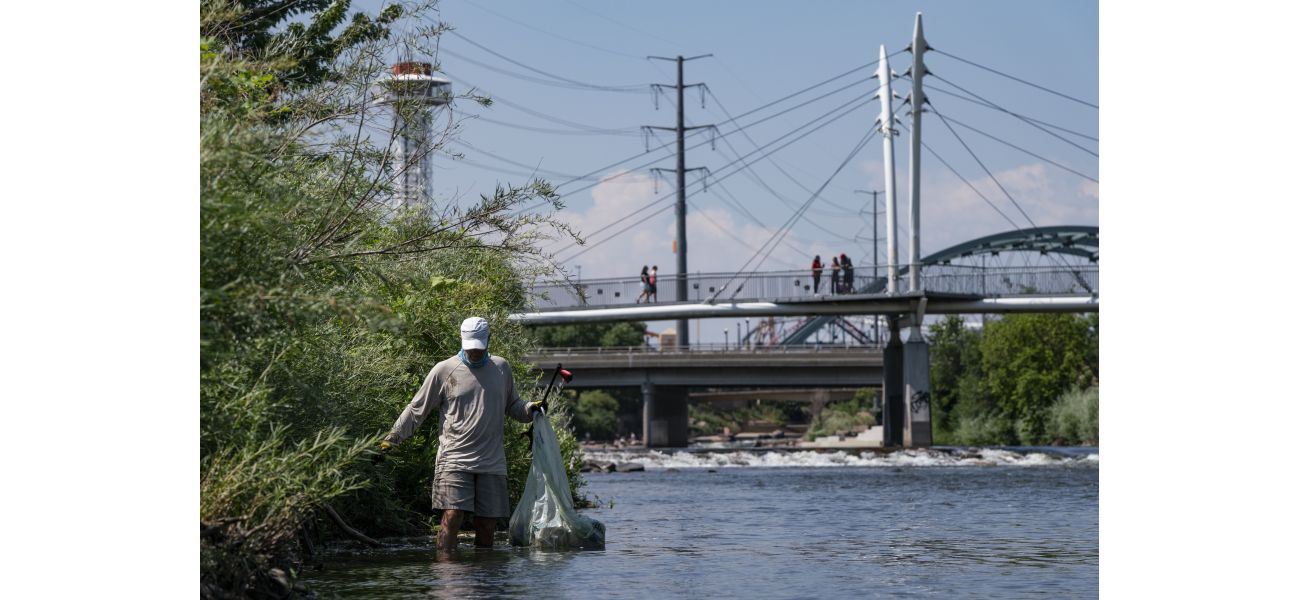Denver's efforts to improve the quality of the South Platte River for swimming face a difficult task.
Denver's focus on the South Platte River has revealed ongoing environmental issues with the water.
September 8th 2024.

Volunteers who regularly clean up along the banks of the South Platte River in Denver often come across a wide range of discarded items, from shopping carts and food wrappers to even outdated car phones from the 1990s. Despite efforts to revitalize the river and develop the surrounding areas, the water quality still falls below state standards in some sections and can emit a strong odor. Former Denver Mayor Michael Hancock had promised to make the river swimmable, but city health officials still advise against going in the water, especially during the summer months. Jon Novick, the administrator for the Denver Department of Public Health and Environment's water quality program, strongly recommends against swimming in the river and suggests using a swimming pool instead for safety.
The recent increase in attention on the South Platte River, driven by developers, community leaders, and city officials, has brought to light the environmental challenges that still exist. The river is impacted by various factors such as wastewater plants and companies like Suncor Energy releasing pollutants like inorganic nitrogen, arsenic, and the class of PFAS compounds known as "forever chemicals." The Denver health department has been monitoring the river's conditions and levels of contaminants for many years, including water temperature, acidity, nutrients, and metals. However, their main concern is the presence of E. coli bacteria, which can cause infections and illness if ingested. This bacteria can enter the water through animal or human waste, and the city's aging infrastructure can contribute to sewage leaks that eventually reach the river. Additionally, all of Denver's stormwater flows into the South Platte, making it particularly important to monitor during the warmer months when E. coli can spread more quickly and concentrations increase as the river flows downstream to the north.
In their most recent water quality report, published in October of last year, the Denver Department of Public Health and Environment ranked the South Platte's water quality as "fair," falling between "marginal" and "poor" but still below "good." E. coli levels exceeded the standard set by the Colorado Water Quality Control Commission throughout the year in 2022, and the river also exceeded standards for naturally occurring arsenic. The river is also impacted by the byproducts of the millions of people who live nearby, including trash, lawn fertilizers, runoff from roads, pet waste, and oil and grease from vehicles. The Mile High Flood District works to help local governments improve stormwater cleaning methods before it reaches the river. Founded after the devastating 1965 flood in Denver, the district has observed some positive trends in the river's health, such as a decline in nutrients like phosphorus and nitrogen, which can cause algae blooms and harm aquatic ecosystems.
However, other water quality issues are worsening, such as salinity, which can damage infrastructure and hurt aquatic life. In an effort to address these issues, the city has implemented bioretention ponds near the Carla Madison Recreation Center on Colfax Avenue. These ponds help retain water and filter it through the soil, rather than allowing it to immediately flow into the river after rainfall. Novick and Holly Piza, the district's research and development director, urge residents to be more mindful of their actions, such as avoiding fertilizers with phosphorus or nitrogen, properly disposing of litter, washing cars at a car wash, and ensuring sprinklers are watering grass and not pavement. Novick acknowledges that the city is making efforts to improve water quality, but also recognizes that there is still work to be done and that individuals can make a difference by being mindful of their actions.
The recent increase in attention on the South Platte River, driven by developers, community leaders, and city officials, has brought to light the environmental challenges that still exist. The river is impacted by various factors such as wastewater plants and companies like Suncor Energy releasing pollutants like inorganic nitrogen, arsenic, and the class of PFAS compounds known as "forever chemicals." The Denver health department has been monitoring the river's conditions and levels of contaminants for many years, including water temperature, acidity, nutrients, and metals. However, their main concern is the presence of E. coli bacteria, which can cause infections and illness if ingested. This bacteria can enter the water through animal or human waste, and the city's aging infrastructure can contribute to sewage leaks that eventually reach the river. Additionally, all of Denver's stormwater flows into the South Platte, making it particularly important to monitor during the warmer months when E. coli can spread more quickly and concentrations increase as the river flows downstream to the north.
In their most recent water quality report, published in October of last year, the Denver Department of Public Health and Environment ranked the South Platte's water quality as "fair," falling between "marginal" and "poor" but still below "good." E. coli levels exceeded the standard set by the Colorado Water Quality Control Commission throughout the year in 2022, and the river also exceeded standards for naturally occurring arsenic. The river is also impacted by the byproducts of the millions of people who live nearby, including trash, lawn fertilizers, runoff from roads, pet waste, and oil and grease from vehicles. The Mile High Flood District works to help local governments improve stormwater cleaning methods before it reaches the river. Founded after the devastating 1965 flood in Denver, the district has observed some positive trends in the river's health, such as a decline in nutrients like phosphorus and nitrogen, which can cause algae blooms and harm aquatic ecosystems.
However, other water quality issues are worsening, such as salinity, which can damage infrastructure and hurt aquatic life. In an effort to address these issues, the city has implemented bioretention ponds near the Carla Madison Recreation Center on Colfax Avenue. These ponds help retain water and filter it through the soil, rather than allowing it to immediately flow into the river after rainfall. Novick and Holly Piza, the district's research and development director, urge residents to be more mindful of their actions, such as avoiding fertilizers with phosphorus or nitrogen, properly disposing of litter, washing cars at a car wash, and ensuring sprinklers are watering grass and not pavement. Novick acknowledges that the city is making efforts to improve water quality, but also recognizes that there is still work to be done and that individuals can make a difference by being mindful of their actions.
[This article has been trending online recently and has been generated with AI. Your feed is customized.]
[Generative AI is experimental.]
0
0
Submit Comment





